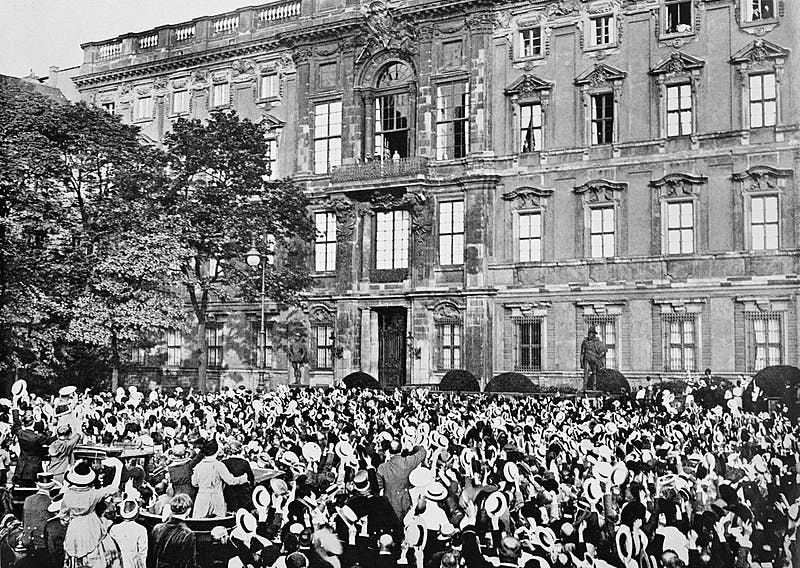Twilight Returns
At the onset of World War I in Europe, the Chicago Tribune responded with an epic of sarcasm that has been read for generations.

As Russ bombs began to fall over Ukraine, we pulled out our tattered copy of “Twilight of the Kings.” We last wrote about it on the centenary of World War I. It was the editorial issued by the Chicago Tribune on August 2, 1914, after the Kaiser went out on his balcony and asked his people to pray for Germany’s success. “Go to church,” the Kaiser had rasped, “and kneel before God and pray for His help for our gallant army.”
The Tribune responded with an epic of sarcasm that has been read for generations: “Pray that a farmer dragged from a Saxon field shall be speedier with a bayonet thrust than a winemaker taken from his vines in the Aube; that a Berlin lawyer shall be steadier with the rifle than a Moscow merchant; that a machine gun manned by Heidelberg students shall not jam and that one worked by Paris carpenters shall.
“Pray that a Bavarian hop grower, armed in a quarrel in which he has no heat, shall outmarch a wheat grower from Poltava; that Cossacks from the Don shall be lured into barbed wire entanglements and caught by masked guns; that an innkeeper of Salzburg shall blow the head of a baker from the Loire. ‘Go to church and pray for help’ — that the hell shall be hotter in the innocent Ardennes than it is in the equally innocent Hessen; that it shall be hotter in the innocent Kovno than in equally innocent Posen.”
With that, we once wrote, the Tribune was just getting tuned up. It mocked the other monarchs — of Russia and Austria — throwing all their peoples into a vast slaughter of moral equivalents. Of the peasants of Serbia, the Tribune wrote that they were to be “dragged from the wheat field when it was ready for the scythe and given to the scythe themselves.” It reckoned that the world was hearing “the last call of monarchy upon Divinity when Asmodeus walks in armor.”
“The kings worship Baal and call it God,” the Tribune roared. “Out of the sacrifices will come, we think, a resolution firmly taken to have no more wheat growers and growers of corn, makers of wine, miners and fishers, artisans and traders, sailors and storekeepers offered up with prayer to the Almighty in a feudal slaughter, armed against each other without hate and without case they know of, or, if they knew, would give a penny which way it was determined.”
Then the famous words: “This is the twilight of the kings. Western Europe of the people may be caught in this debacle, but never again. Eastern Europe of the kings will be remade and the name of God shall not give grace to a hundred square miles of broken bodies. If Divinity enters here it comes with a sword to deliver the people from the sword. It is the Twilight of the kings. The Republic marches east . . .”
It was not until 1917, three years after “Twilight of the Kings,” that America entered the war. The Tribune’s proprietor, Robert McCormick, though an isolationist at heart, did appear in arms in World War I. It was the proudest deed of his life. He maintained the title of colonel for the rest of his days. He named his estate, Cantigny, after the French village where he’d served and built on it a museum of the First United States Infantry Division.

